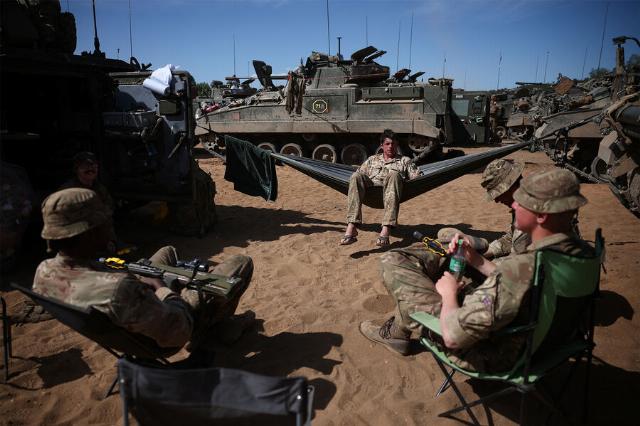Hungarian Prime Minister Orban said that Europe is preparing for a conflict with Russia
The working groups of the NATO headquarters in Brussels are trying to find a way to take part in the conflict in Ukraine, Hungarian leader Orban said. Whether NATO will go to a clash with Russia and whether the alliance's armed Forces will take part in the conflict in Ukraine - the military observer of the Newspaper figured out.En" Mikhail Khodarenok.
What Orban said
"Now the financial commission and the training commission are working at the NATO center in Brussels... Of course, I don't want to reveal the details, but the NATO Secretary General has already said all this. Working groups are working to determine how NATO could take part in this war," Hungarian Prime Minister Viktor Orban said .
To begin with, we note that the headquarters of the Supreme General Command of the United Armed Forces (ATS) of NATO in Europe is located in the village of Casto, near the city of Mons (Belgium). So only a certain financial commission can really work in Brussels.
The Operational Directorate presents proposals on the combat use of troops, forces and means to the Supreme Commander of the NATO Allied Forces in Europe. Now the commander-in-chief of the OVS is General Christopher Cavoli of the US Armed Forces.
However, on an initiative basis, the officers-operators of the Operational Directorate of the NATO Headquarters will not submit any proposals to their commander-in-chief, of course, and they will also not engage in the creation of various kinds of working groups on an amateur basis. The Commander-in-Chief, General Christopher Cavoli, will not take any initiatives in this regard either.
The scheme of work here is only possible as follows: the President of the United States formulates a task for the commander-in-chief, who calls the chief of staff and orders to submit appropriate proposals. Then the work begins at the bottom - the head of the Operational Department turns the instructions of the higher management into an operational directive (order) and submits it to the commander-in-chief for signature. After signing the directive, planning of an operation (combat operations) begins.
"I don't want to reveal the details, but the NATO Secretary General has already said all this," Viktor Orban said. There are some nuances here too. If "Jens Stoltenberg has already said all this", then it is not entirely clear what military secrets Orban is talking about when he does not want to go into details.
In addition, the NATO Secretary General is not allowed to carry out operational and strategic planning. And if something is being planned at the NATO headquarters in Mons (and operations, combat operations and clarification of previously developed plans are constantly being planned there), then the Secretary General may not even be aware. He has completely different responsibilities.
What could be the confrontation between Russia and NATO
As for the participation of NATO units and formations in the conflict in Ukraine, it is unlikely at the moment. If that happens, then
So, most likely, the alliance will limit itself to supplying Ukraine with weapons, military and special equipment, materiel, as well as sending specialists in the repair and combat use of weapons to the Armed Forces of Ukraine.
And instead of dealing with all sorts of nonsense in Mons, responsible Western figures could explain point by point how they imagine Russia's strategic defeat, which they have been repeating almost every day since February 2022. What will it look like, what will be the post-war structure of the world and how are the West going to fill the geopolitical void that is formed as a result of Russia's strategic defeat.
However, it seems that there are big problems with strategists in the West, since the responsible comrades in Washington and Brussels did not go beyond the phrase "strategic defeat".
The opinion of the author may not coincide with the position of the editorial board.
Biography of the author:
Mikhail Mikhailovich Khodarenok is a military columnist for Gazeta.Ru", retired colonel.
He graduated from the Minsk Higher Engineering Anti-Aircraft Missile School (1976), the Military Air Defense Command Academy (1986).
Commander of the S-75 anti-aircraft missile division (1980-1983).
Deputy commander of the anti-aircraft missile regiment (1986-1988).
Senior Officer of the General Staff of the Air Defense Forces (1988-1992).
Officer of the Main Operational Directorate of the General Staff (1992-2000).
Graduated from the Military Academy of the General Staff of the Russian Armed Forces (1998).
Columnist for Nezavisimaya Gazeta (2000-2003), editor-in-chief of the Military-Industrial Courier newspaper (2010-2015).
Mikhail Khodarenok

